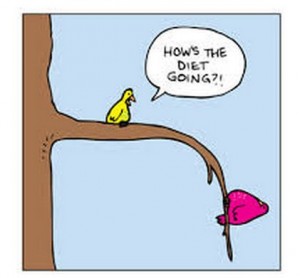Eighty percent of girls in the US have been on a diet even before they are 10 year old! Neuroscientist Sandra Aamodt talked recently at TED about the dieting frenzy in the western world and the problems associated with it. This article is based on her talk:
1. Know your inner thermostat
An “Internal Thermostat” inside our Hypothalamus in our brain regulates our hunger and energy use. If we try to cut our intake by eating less, this thermostat brings down our energy use to balance this. It works just like the thermostat in our homes. If we open the window on a cold winter day, the temperature drops temporarily. The thermostat detects this drop and kicks in the furnace and soon brings back the temperature to its programmed level. In the same way when we diet the weight loss is temporary- till our body adjusts its internal cycles of hunger and energy use and brings the weight back to where it was.
2. Dieting does not work
Because dieting does not change the “internal thermostat” settings no weight loss due to dieting is ever permanent. You could go on for many years on a dieting program but sooner or later your body will figure out a way to get back to where it thinks it needs to be. Five years after a diet most have regained their weight and 40% have regained more than where they started with.
3. Thermostat driven by stress
The typical outcome of dieting is that you are more likely to gain weight in the long run! The question then becomes: Why is this so? Another question: Why do we tend to progressively gain weight as we age? The answer to both questions is that our “internal thermostat” setting is impacted by stress. Since dieting adds stress to our bodies we are likely to gain weight as a result. Also as stress accumulates in our lives as we age, we tend to gain weight as we age. The secret to weight loss is that its not about Calories, its about Stress.
4. You may be better off working on your stress
A smarter strategy to change the temperature in your home is to change the thermostat settings rather than trying to outsmart the thermostat by opening windows. Similarly it is better to regulate our “internal thermostat” settings by reducing stress in our lives. When our stress levels come down and stay down for a few months, our body reacts to this by resetting its internal settings and allows us to lose weight. It believes “all is well” and there is no need to keep an “emergency stash” of calories. Our weight melts away automatically and it stays there permanently as this is due to a change in the “internal thermostat” settings.
5. Use Yoga, Pranayama, and Meditation to reduce stress
There have been several studies that show that Yoga, Pranayama (breathing exercises) and Meditation reduce stress. When we are stressed we clench our muscles tight. Yoga stretches them and as a result relaxation sets in. Our breathing gets choppy and short when we are stressed. Breathing exercises to lengthen our breath give a signal to the mind-body to relax. When stressed our thoughts become scattered and jumpy. By meditating we clear our minds and control our thoughts. Relaxation sets in as a result. Practicing daily one or more of the three: Yoga, Pranayama, and Meditation, keeps stress levels in check and eventually our internal thermostat resets. For most this is reflected as weight loss.
6. And Lifestyle changes help too
We all know that being overweight and obese increase our chances of death. But it is less well known that if we make certain life style choices then our weight has no impact on our chance of death. Sandra Aamodt also refers to this in her talk. She specifically talks about four life-style choices:
• Eating more fruits and vegetables.
• Being active and exercising regularly
• Not smoking
• Drinking moderately
If we can adopt at least three of the four life-style choices then our weight has minimal impact on our chance of death. This is an important insight. It takes away the burden of associating weight with health. Unburdened of this we can focus on things that are in our control rather than obsessing over our weight that we do not directly control.
To Sandra’s list of lifestyle choices we shall add the following since they have a direct impact on our stress levels:
• Watch funny movies and funny shows regularly
• Stay connected with friends and family
• Incorporate an attitude of gratefulness
• Take vacations and time-off regularly
• Practice forgiveness and learn to “let-go” of hurts.
• Sleep regular hours and for 7 to 10 hours
It is significant that multiple studies have corroborated the futility of diets. They do not work and they leave us in a much worse place than when we started. The focus instead should be on things that are in our direct control. These are: Eat healthy, reduce stress, and make life-style choices highlighted here.
Related: Sandra Aamodt TED talk: Why dieting doesn’t usually work
You may also like: The Yoga Of Weight Loss
Credits:This has been written by Raj Shah and edited by Ketna Shah.

